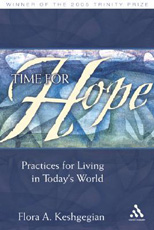According to theologian and Faculty Ombudsperson at Brown University Flora Keshgegian, the once buoyant and optimistic Christian view of time, history, and hope has been deflated and ignored in this postmodern, cynical, and violent era. The western narrative of time as linear, progressive, and teleological is being challenged on all fronts. Keshgegian outlines in a cogent and convincing way six of the reasons why this has happened:
1. The emerging voices of oppressed and marginalized groups and their project to insert themselves into all dialogue about theology and history.
2. A serious acknowledgement of the harm people have done to one another in history.
3. The expanding knowledge that we are destroying the planet and each other thanks to our greed and selfishness.
4. The power and presence of global capitalism and its toxins.
5. The dominance of postmodern thinking and its challenges to the old Judeo-Christian view of things.
6. The ideal of pluralism and what it means for the future.
In the traditional Christian perspective the good will win and God will carry the day with a happy ending. But a handful of theologians have other takes on history and its ambiguities. They challenge us to maintain a vision of love and justice, freedom and peace. The writers covered here are Rubem Alves ("Hope is hearing the melody of the future. Faith is to dance to it."); Peter Hodgson; Rosemary Reuther ("Redemptive hope is the constant quest for the Shalom of God which holds us all together, as the operative principle of our collective lives"); and Sharon Welch ("The source of work for justice is beauty; being grateful for the gift of life, honoring it, celebrating it, playing our part in this chaotic, glorious adventure").
In a chapter titled "Black Holes and Fractured Fairy Tales," Keshgegian marches us through an abbreviated overview of violence, suffering, and trauma in history. In the next chapter, she focuses on the present moment and several movements in our society whose practices and attitudes reveal a different way of thinking about time. They are feminist theology with its emphasis on embodiment and the cycles of life; the ecological movement which puts us in sync with the rhythms of the earth; the everydayness of Hispanic American spirituality; the Buddhist teachings of Thich Nhat Hanh; and Christian liturgical and ritual traditions. All of them hallow time and incarnate a mindfulness that is healing and helpful.
Keshgegian hits high stride when she offers the following:
"Hope is about commitment to life as ongoing. In that sense hope is directed toward the future but not as an end. Hope is living with vision as the values we give our lives to and that guide our living. An attitude and a value in itself, the content of hope is not specific. We do not know the needs of life of another place and another time. Our vision is limited; our finitude sets boundaries on our living. So we cannot specify the content of hope for all times and all places. We can name it only for our own context. Nor is hope utopian. A modesty of hope does not make hope any less compelling, any less necessary. Indeed, it has the opposite effect. Our hope is quite intensified in the moment, whichever moment, in which we live."
The author ends with five habits that can fuel our re-imagining of hope: honoring time, moving in place, imagining creatively, participating in interrelation, and living in wild wonder.
